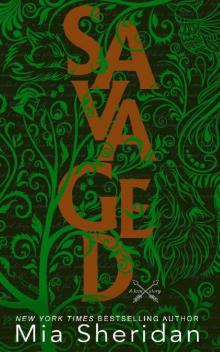- Home
- Mia Sheridan
Fallen Page 4
Fallen Read online
Page 4
Haddie was deeply focused on her drawing tablet on the table in front of her, her colored pencil scraping softly over the paper. Scarlett clicked the mouse on the laptop in front of her, opening the program she was using to design the planned remodels on the house. She raised her gaze, glancing around the room. The size would work for her needs, but the entire layout would have to be reworked, the space gutted. Then she’d bring in industrial appliances, a prepping station . . .
The scraping of Haddie’s pencil drew her attention, the back and forth motion growing ever faster as her daughter worked diligently to color something in. Scarlett focused on the picture, what looked to be a page almost completely covered in black. She frowned, leaning forward. “What are you drawing, honey?”
Haddie blinked, her hand stilling as she looked up at her mother. Scarlett frowned, taking in the drawing from upside down. “Are those . . . horns? What is that, baby?”
Haddie glanced down at her drawing, looking at it curiously as if seeing it for the first time, as if she hadn’t been the one to create it. She tilted her head. “I don’t know.”
Scarlett watched her for a moment. Her daughter’s imagination had always been vivid. But though her drawing looked particularly morose, she didn’t appear distressed and Scarlett released a slow breath, and then took a sip of wine as Haddie went back to her work.
“See anything cool while you’ve been out exploring the property?”
Haddie stilled for a moment. “Just the flowers I brought you. And . . . something with horns.” She gave a small nod down to her picture, her lashes lowering. “And a fox.”
Scarlett frowned. “Oh . . . honey, maybe you should stay out of the trees. There are probably lots of wild animals that live in there.”
“The fox didn’t want to hurt me, Mommy.” She said it with the surety of a sage, as if it was an inarguable fact. As if she’d communicated with the fox and it’d told her of its intentions.
Scarlett regarded Haddie. She’d always seemed to sense things about people, and yes, even animals. Sometimes she went right up to a dog, kneeled down, and began petting him, and other times, she’d pull Scarlett to cross the street if one was coming toward them. She responded the same way with people. She either liked them immediately, or never warmed to them at all.
Merrilee had once asked Scarlett if she thought Haddie might be on the autism spectrum, but Scarlett had rejected that. It wasn’t that she was in denial, it was just that no one knew Haddie better than she did. Haddie had a vivid inner world, that was true. But she was overly emotional if anything. She felt things deeply and was keenly intelligent. She could be . . . secretive, but she also wore her heart on her sleeve. Plus, she had never had a problem with eye contact as many children on the spectrum did, in fact she seemed to seek it out. Sometimes Scarlett was sure the little girl was looking straight into her soul. Haddie was . . . unique, but Scarlett didn’t think her uniqueness could be tested or quantified. Haddie was just . . . Haddie.
She’d like to ask Haddie’s father about the things that made their daughter special, to find out if it might be something genetic, but of course, that ship had sailed. She’d promised never to contact him again and signed her name on the dotted line.
Very literally.
“Maybe from now on just . . . keep to the edge of the woods, okay? I want you to be able to hear me if I call.”
“All right, Mommy.” The pencil sounded on the page again, this time with less intensity. Without looking up from her drawing, Haddie asked, “How long did your friend Kandace live here, Mommy?”
Surprised by the question, Scarlett paused. Had she told Haddie that? Well, obviously, she must have. Or once again, maybe she’d overheard her talking to Merrilee about Kandace. Haddie could be so quiet it was easy to forget little ears were always listening. Kandi. “Only a short time. Less than a year.”
“When this was a . . . school?” The pencil continued to scratch softly on the paper, a lulling sound now that Haddie moved it more slowly, more steadily, and with less fervor.
“Hmm-hmm.” She glanced out the window behind Haddie where the forest met the sky, thinking of her childhood friend. Her first real confidante. When Scarlett’s father had passed away suddenly and unexpectedly, Scarlett’s—mostly unskilled—mother had had to go back to work. She’d taken a housekeeping position at the Thompson family estate, and Scarlett, often trailing along behind her, had befriended Kandace, the only Thompson child, who was three years Scarlett’s senior. Scarlett had been grieving her father, and with his passing, had been thrust into what felt like an entirely different life. Kandi had taken her under her wing and offered the healing gift of friendship. While Scarlett’s mother cleaned, Scarlett and Kandace would play make-believe and dress up in the expansive attic, usually donning one of the five wedding dresses Kandace’s mother had gotten married in over the past thirteen years of Kandace’s life.
Despite Kandace’s older age, and her often seemingly indifferent attitude, Scarlett knew that deep down, Kandace was tender and kind. She’d been desperately looking for validation—attention and affection—and never receiving it from the one person who should have given it naturally: her mother.
It was no wonder she’d made the choices she had. It was no wonder she’d sought “love” in all the wrong places. It was no wonder she’d ended up at Lilith House, a reform school for wayward girls.
Even after Scarlett’s mother took a new position with a different family, she and Kandace kept in touch—even if months would pass between phone calls—until right before Kandace left for Lilith House. Lilith House where Kandace had eventually run away from, never to be seen again. Scarlett had known that Kandace had headed down a dangerous path, she’d known that Kandace was skating the razor’s edge of decisions that had consequences she’d never come back from. She’d hoped . . . along with Kandace’s mother, she was sure, that Lilith House would help put her back on the straight and narrow. Instead . . .
Scarlett’s eyes again went to the edge of the vast forest beyond. Where did you go? she wondered. Where are you now? They’d searched the woods. She wasn’t there. But being here made Scarlett feel somehow closer to the troubled girl who’d shared her heart with her, and few others.
“Tell me about Ruby Sugar.”
Scarlett smiled. Haddie knew about Ruby Sugar, the name Scarlett had chosen for her business, but like all of Haddie’s favorite stories, she liked to hear it being retold. “Kandace and I played a game where we were wedding designers. We used our names to create the company name. Ruby is another word for Scarlett, and sugar is the main ingredient in candy.” Or . . . Kandi.
Haddie smiled. “I like that, Mommy.”
Scarlett smiled back. She did too. Especially because when she’d seen the ad for Lilith House and recognized it as the school Kandace had been banished to, and then run away from, she’d gotten a feeling that was so strong, so absolute, that she’d picked up the phone before she even made a conscious decision to do so.
A sound caught her attention and she turned her head toward the wall where she thought it was coming from, listening intently. It sounded like . . . faraway screaming, the rising wail of human misery. Scarlett stilled, goosebumps rising on her skin. The noise subsided, but another one picked up. This time it sounded like crying—the very distant sobs of an infant.
“What in the world?” she whispered. “Haddie, do you hear that?”
Haddie looked up from her drawing. “What, Mommy?”
“It sounded like crying. It must have been the wind, but . . .” She shook her head, mustering a smile for her daughter. “Wow, kind of spooky the way a breeze sounds coming through these old walls, huh?”
“It’s just a memory, Mommy.”
Scarlett frowned. “What do you mean, Haddie? My memory?” Did Haddie think she was hearing things coming from her own mind?
“Lilith House’s memory.”
Those goosebumps rose higher. “What do you mean, baby?”
&nbs
p; Haddie shrugged, focusing back on her drawing, humming softly.
Scarlett stared at her daughter for a moment, opening her mouth to demand that she explain her comment further, but Haddie seemed perfectly content and Scarlett didn’t want to push her child and potentially alarm her when there was really nothing to be alarmed about. Add that comment to the list of hundreds like it she’d heard from her over the years. She turned her head, staring out the window, mostly unseeing for another few minutes, attempting to warm from the chill that had settled under her skin as Haddie continued to draw. No more sounds came from the walls. Trees shifted outside, swaying gently. There was definitely a strong breeze. Finally, convinced she’d heard nothing more than wind rattling the rafters, she looked at her computer screen, rubbing at her eye as she tried to find the motivation to do some more work on the remodeling plans. She drummed her fingers on the table for a moment, instead opening a browser window and typing in the name of their new house. Several links popped up immediately. Thank you, Louis, for bringing Lilith House into the modern century.
She’d looked Lilith House up once before from their apartment in LA, but more so to view as many pictures of the interior as possible . . . to determine if it was right for what she had planned. In all honesty, part of her had been hoping it wouldn’t be. She’d come upon the sale so unexpectedly, and the idea that had almost immediately planted itself in her head felt far too ambitious . . . ill-advised . . . crazy, even. But also . . . right. She’d never been particularly impulsive, and when she had been, she’d usually ended up regretting it in at least some way or another. But the more she’d clicked through the available pictures, traveling remotely from room to room then each outdoor space, the more her excitement level doubled, tripled, soared. It was as though someone was quietly, but urgently, nudging her along.
At the time it was the physical attributes of the house and property she’d been most interested in, so she hadn’t taken much time to find out more about the history. She did that now, perusing slowly through the websites that mentioned the house, gathering its history.
Before the California Gold Rush in 1849, hunters had flocked to the state to take advantage of its enormous wealth of resources. One such man, Hubert Bancroft, made his fortune as a fur trader and in 1876, then built what was later named Lilith House. Though the family—who only grew wealthier as trade increased and they delved into other business ventures—would eventually build on and expand the dwelling, it was considered one of the finest mansions of its time, especially in a part of California that remained relatively poor.
When more recent generations, apparently lacking the same ingenuity and grit as their forefathers, all but squandered the family fortune, Black Monday was the final nail in the coffin of their wealth, and in 1987, Wendell Bancroft, now penniless, walked into the forest and hung himself from the branch of an ancient ponderosa pine. The bank took possession of the house.
In 1988, the leader of the Women’s Ministry in Farrow reported receiving a directive from God that they purchase the Bancroft house and turn it into a Christian girl’s school to house troubled young women. The Women’s Ministry members pooled all of their resources, and with the townspeople’s help, they raised the money for the purchase of the property. They named it Lilith House, and began accepting applicants in the fall of 1989.
Scarlett clicked on the image of an old brochure, a logo at the top with a tagline beneath: My utmost for His glory! She read it once and then again. What did that mean? Some Biblical phrase, she assumed. There was a block of copy below and she zoomed in on it: Lilith House seeks to mend and rebuild the characters of girls who have consistently turned toward Satan and away from their Savior.
Scarlett squinted one eye. Maybe she wasn’t the most religious person—though she’d count herself as spiritual—but that copy sounded downright disturbing. Who read that and thought, that’s where I’m sending my child?
Parents at the end of their ropes, she realized with a sigh.
She zoomed in on the photo on the cover. It was a group of twelve girls standing stoically in front of what was now Scarlett’s home. As her eyes moved from face to face, a chill moved through her, born of what she wasn’t entirely sure. These were supposedly defiant troublemakers, and yet each one of them looked empty-eyed and slack-jawed, staring vacantly at the camera. Her eyes were drawn to two young women at the edge of the group, one with vibrant red hair, and the other tall and dark haired. An older woman stood just next to them, wearing a gray dress and a choker of pearls. She was unsmiling, but there was an out-of-place . . . almost . . . perverse satisfaction in her expression that caused Scarlett to instinctively lean away from her photograph.
She glanced quickly through the rest of the brochure that talked about programs and amenities, and then looked back at the photo, averting her eyes from the gray-haired woman. The students were wearing burgundy uniforms and they all sported the same short haircuts devoid of any real style—which, was it just her, or was that sort of odd?—so Scarlett couldn’t tell what year the photo might have been taken. Kandace wasn’t in it, so it had to be taken prior to her arrival. She’d run away from Lilith House just before the fire broke out and the school shut its doors forever, so no brochure would have been created after Kandace left.
If it was taken just before Kandi arrived, these might be the twelve students who died tragically in the fire. Scarlett swallowed, her shoulders drawing up as her gaze again bounced from one unsmiling face to another. Troubled girls, sent off by their families, never to return.
She tried to picture beautiful, stylish Kandi in one of those boxy, nondescript uniforms, a choppy haircut, and no makeup and couldn’t. Kandace, who had always favored tight jeans and bright lip gloss.
Scarlett did another Google search about the fire that had occurred in the small chapel that had once sat behind Lilith House. She knew the twelve young women living there at that time had died tragically in the fire, along with five staff members. Seventeen souls had perished. What she didn’t know was that it was thought a lightning strike had caused the fire. “How awful,” she murmured.
“What, Mommy?” Haddie asked.
Scarlett brought her head up. She’d become too involved in her search, fallen down the rabbit hole of Lilith House’s past. But what a past it had. “Nothing, honey. But guess what? The movers are going to be here tomorrow with our beds and our other things,” she said to Haddie with a smile.
“No more camping?”
Scarlett smiled. “No more camping.” She tilted her head. “You know how I told you I thought we needed a whole new fresh start?”
Haddie nodded.
“Well, I think this house does too. Do you get that feeling, Haddie?”
“Yes, Mommy,” she whispered.
Scarlett smiled, reaching across the table and taking her daughter’s hand. “Then let’s make it happen. Do you think we can do that?”
Haddie’s expression faltered and she glanced out the window. “I hope so, Mommy,” she whispered.
CHAPTER SIX
Thirteen Years Ago
Kandace stepped into the room where Jasper had led her up a narrow set of steps, the door clicking closed behind her as his heavy footsteps descended. She was in the attic. A wide-open space with a peaked, beamed ceiling and a partially stained-glass window at the end, the nighttime forest stretching as far as the eye could see.
Two girls sat on beds, their bodies still, staring at her with wide eyes. One of the girls, a chubby redhead nodded to an empty, twin-sized metal bed by the window. “That’s yours, I guess,” she said, her voice barely above a whisper.
Kandace looked at it, noting the clothes draped over the thin gray blanket: two all-red uniforms, two white nightgowns, two pairs of white cotton underwear, and a white bra. Sitting on the floor was a set of black penny loafers. “Are you kidding me?” Kandace muttered softly, fingering the stiff fabric of the calf-length uniform skirt.
A red uniform? Seriously? Dark red, but s
till. She was sure it signified something. “Is fucking red the color designated to fallen women, or what?” she asked the other two girls, thinking of the story of Lilith Ms. Wykes had told.
“Shh,” the tall girl with black hair hissed. “If they catch you swearing, there’ll be a punishment.”
Kandace looked back and forth between the girls, noting they had the same short, shaggy haircut she now had. Evidently, violent, forced haircuts were status quo at Lilith House. “What’s with this fucked-up place?” she asked, lowering her voice as she swore again. “Is everyone here like Ms. Wykes? Because if so, we need to get PETA out here, stat.”
The girls glanced at each other. “Not exactly but . . . they all follow her lead. They do whatever she says. Unquestioningly,” the girl with black hair said. “The bird?” she asked.
Kandace nodded. “Is that part of every greeting?”
They shook their heads in unison. “We didn’t experience that. Apparently, she saves it for the girls she thinks need an immediate lesson in compliance. But we’ve heard talk of that and . . . well, we were walking by her office earlier and heard the . . . noises.”
Noises. That seemed like an insufficient word to describe the bird screams that still rang in her head.
Kandace turned toward the window, mentally shaking off the memory of what had been done to the poor creature . . . the awful sounds it had made as it died . . . She refused to think about it anymore, though. It had been done to control her, to horrify her, and Kandace refused to be controlled.
“Ms. Wykes told us about the natives who used to live in those woods,” the redhead said, and when Kandace turned toward her, she glanced at the black-haired girl who nodded. “She said one’s still out there, a war-mongering demon hungry for human flesh.”
Kandace laughed, but when the other girls did not, she put her hands on her hips. “You can’t be serious.”

 Leo
Leo Becoming Calder
Becoming Calder Leo's Chance
Leo's Chance Midnight Lily
Midnight Lily Finding Eden
Finding Eden More Than Words
More Than Words Kyland
Kyland Archer's Voice
Archer's Voice Stinger
Stinger Most of All You
Most of All You Preston's Honor
Preston's Honor Brant's Return
Brant's Return Fallen
Fallen Where the Truth Lives
Where the Truth Lives The Wish Collector
The Wish Collector Grayson's Vow
Grayson's Vow Where the Blame Lies
Where the Blame Lies Stinger sol-3
Stinger sol-3 Seek
Seek Savaged
Savaged Dane's Storm
Dane's Storm Kyland (Sign of Love #7)
Kyland (Sign of Love #7) Becoming Calder (Sign of Love #5)
Becoming Calder (Sign of Love #5) Ramsay (Sign of Love #10)
Ramsay (Sign of Love #10)